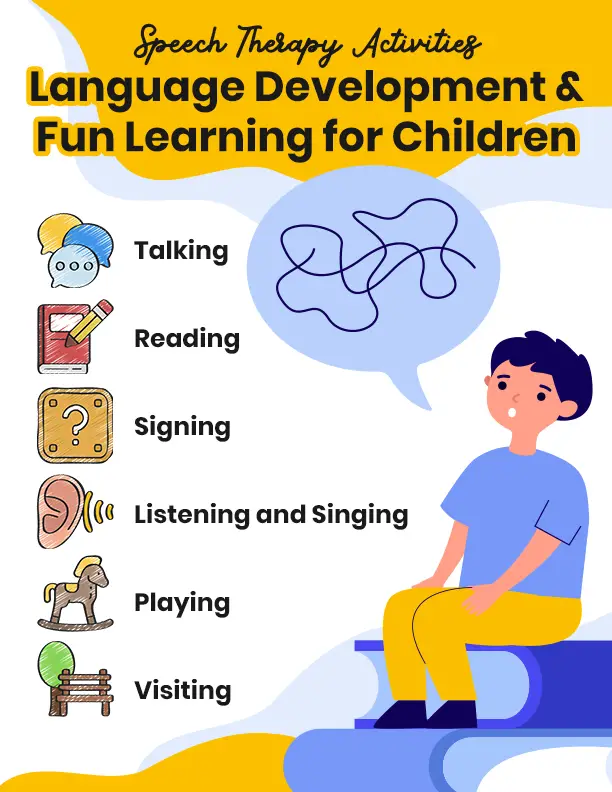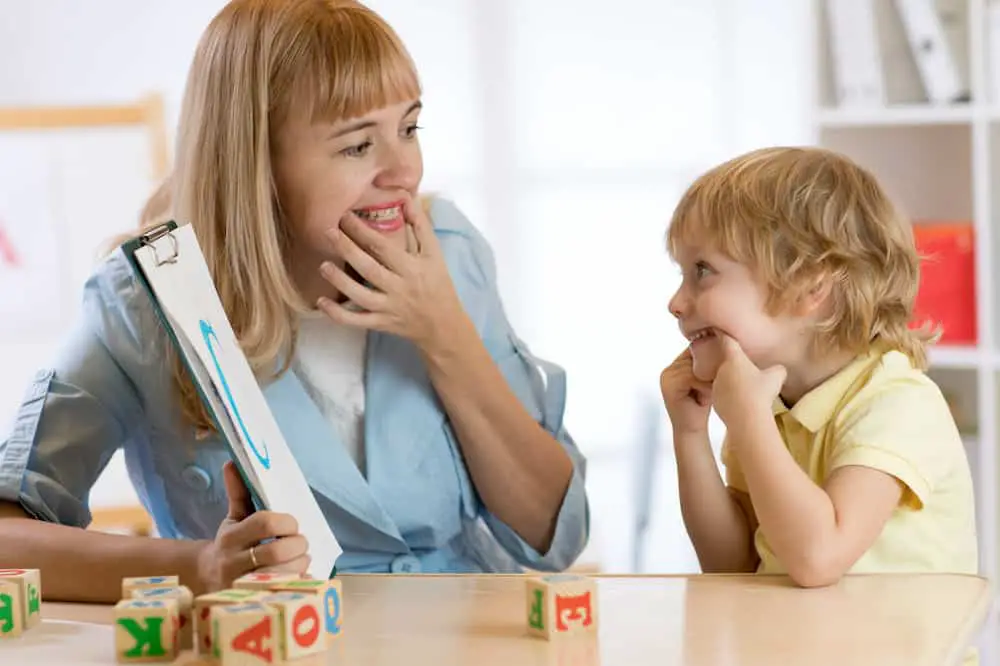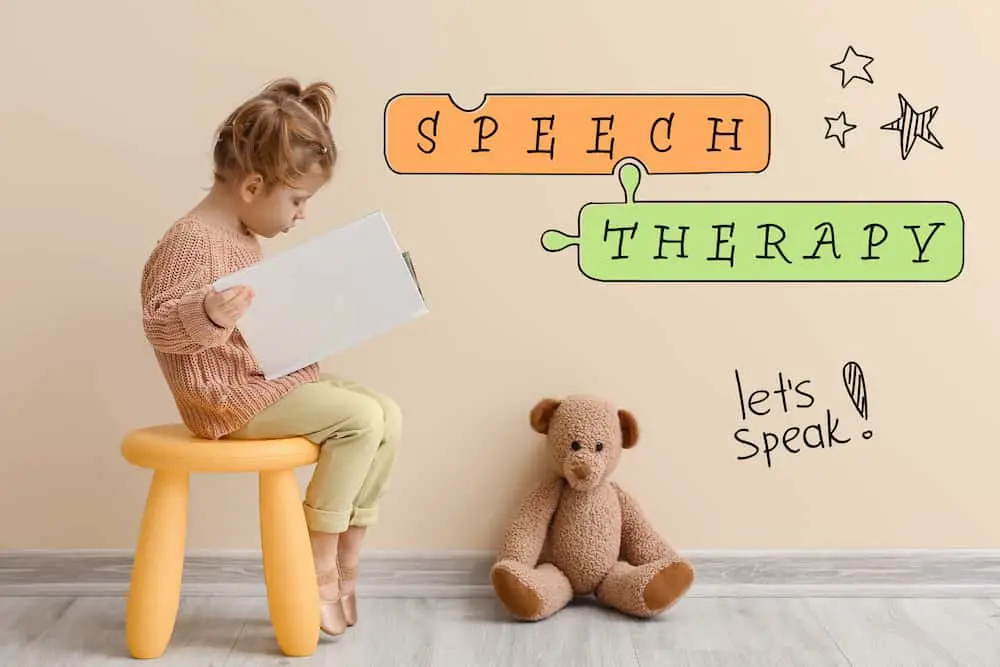Many different types of speech and language disorders can affect children.
Two of the most common problems are associated with articulation, correct letter pronunciation, and fluency, including stuttering.
If your child is having trouble forming words or phrases correctly, then speech therapy activities might help.
Whether you’re actively engaged with a speech therapist or not, keep reading for some great tips and speech therapy exercises for you to practice at home.
Speech Therapy Activities
Speech therapy has been proven to be most successful when started at an early age with the help of a parent or caregiver.
Anyone can encourage their child to develop language and vocabulary faster at home, rather than just rely on their school teachers.
In fact, most parents engage in speech therapy exercises with their children daily and don’t even know it.
What Are Speech Therapy Exercises?
Speech therapy exercises are designed to help improve your child’s ability to form speech and language and communicate more effectively.
They can help benefit speech disorders developed in childhood and speech impairments in all ages caused by injury or illness.
Speech therapy exercises that will have the most benefit will depend on the person’s age and the type and severity of their speech disorder.
Still, speech therapy exercises are good for all children to help them develop language more quickly and effectively.
What Activities Promote Language Development?

As a parent, you can do many things to encourage language development in your child.
All children will learn at their own pace, but there are speech therapy activities for preschoolers and older children you can engage in, even when your child is very young, that will help them develop language faster.
Talking
It’s recommended that you talk to your child often, even when they are very young, babbling from the pushchair.
You can talk about what you’re doing at the time or what’s going on in the world around you as you walk them through the park.
You can point out colors, trees, flowers, birds, or animals, anything that might interest them, and then tell them stories about what you’ve seen.
Pausing from time to time allows them to respond, which helps them understand the natural flow of a conversation.
Speaking to them will help them develop vocabulary, regardless of whether they can speak or not.
Reading
Children love repetition and respond well to hearing the same stories or watching the same movies over and over again.
It may be annoying for the rest of the household, but the repetition helps your child recognize, learn and understand what different words mean.
Signing
Teaching your child American Sign Language can help your child communicate before they can speak.
A simple sign, for words like hungry, thirsty, or hurt, will let babies communicate vital information.
This can reduce frustration in very young children because they can express themselves sooner.
Babies as young as six months can remember simple signs and, from eight months, form simple signs themselves.
Teaching sign language to preverbal babies can also help speed up speech development.
By allowing them to practice expressing themselves sooner, they often speak sooner and have a more extensive vocabulary.
Listening and Singing
Children love to sing and dance and listen to familiar songs.
Children’s songs often have dances or actions that go along with them to help them learn what the words mean.
Teaching your child these songs (and actions!) will help speed up their learning and comprehension of the words used.
If a song doesn’t have any actions to go with them, then you can use a book or flashcards to help your child learn what the words mean.
Playing
Playing with toys and with others will also help your child’s language development.
You can further encourage the learning by helping them count blocks as they build a tower.
Or by asking them to pass you the red ball, followed by the yellow ball, and so on.
Playing with other children is important so that they can practice their newly acquired speech skills.
It’s also fun for them to practice speaking with similarly-aged or similarly-skilled children.
Visiting
Children love exploring new places, and these unfamiliar environments can provide a lot of mental stimulation for them.
Visiting the zoo, park, or science center will help increase your child’s thirst for knowledge.
You can name all the new things you see together while reinforcing other things they may have only seen in books or heard about in songs.

How Do You Make Speech Therapy Fun?
If you have a slightly older child, it can be more difficult to keep them interested in their speech therapy exercises.
Maybe you need your kid to read through a short story without stuttering or they need to practice pronouncing their R’s correctly.
Either way, engaging them in fun speech therapy activities will make their therapy more enjoyable for both of you.
The more enjoyable it is for your child, the harder they will try, the more they’ll achieve, and they may even start looking forward to practice.
Below are some fun speech activities for preschoolers and beyond to help spice up your child’s speech therapy.
Incorporate Movement
It’s important to remember that kids often have a lot more energy than us.
Incorporating movement into their speech therapy activity will help them expend energy and make the entire session more fun for them.
Challenge your child to say their sounds or sentences while standing on one leg.
You can also incorporate yoga into your practices and see how many times they can practice while holding one yoga pose.
Let them choose the yoga pose they want to do and then help them into the correct stance before they start their sounds.
Also, whenever the weather or circumstance allows, take the practice session outside.
If you know your child likes doing handstands, then why not see if they can practice their sound for each handstand they do?
Whether it’s playing hopscotch or balancing on a beam, your child will be more eager to complete each activity you set them.
Personalize Activities
You can also try personalizing your child’s activities to their interests and hobbies.
Take a book or movie they’re fond of and make flashcards that feature their favorite characters or learn the lyrics of their favorite song together.
Fun speech therapy activities for preschoolers may feature their favorite Disney characters, while for older children, they could be themed around High School Musical or Taylor Swift.
Get Crafty
Crafting is an excellent opportunity to use and understand language.
Keep the conversation going while you’re cutting, gluing, and glittering.
If your child isn’t verbal, then you can talk to them, explaining what you’re both doing at each step of the craft.
If you need to encourage them to verbalize more, then let them talk you through each step, so they feel like they’re teaching you.
If you have exercises to complete, then you can ask them to practice their sounds or tasks before they’re allowed to advance to the next step.
Plus, you can name colors, count how many circles or squares you’re sticking, place things inside and outside, on top of and underneath.
You can stick soft things and hard things, and long pieces and short pieces.
Like we said, crafting is really quite an amazing opportunity for language learning.
Play Games
There are games designed specifically for speech therapy, but you can also incorporate any of their favorite games into your sessions.
If it’s a game where you take turns, you can split the session into smaller bite-size chunks to practice between each player’s turn.
If the game has multiple pieces, then you can ask them to practice before giving them another piece to play with.
Games like Pictionary, Scrabble, and charades also help encourage vocabulary development and communication skills.
Making Learning Fun
Choosing fun speech therapy activities for your child is important so that they don’t view their therapy as homework.
Keep it interesting for them by thinking of ways to work their practice session into or around their interests.
Ask them to practice their sound several times before shooting a basketball or initiate conversations in subjects that interest them.
And for those times when you’re feeling uninspired, there are also apps and games available that can help you target specific skills.

